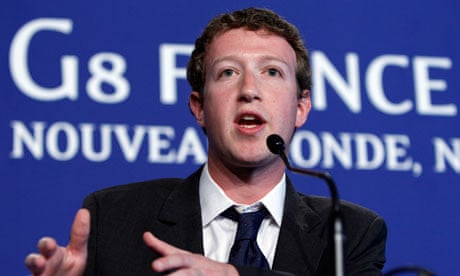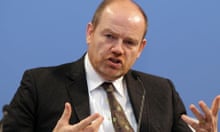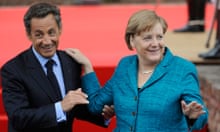Leading internet figures have warned world political leaders against trying to regulate the web, telling them to leave alone a process that has flourished without government interference.
Facebook's founder, Mark Zuckerberg, wearing a rare suit and tie, told leaders at the G8 that excessive regulation would not work, and called for more investment in high-speed technology.
G8 leaders agreed a communique in which they welcomed the role of the net in providing economic growth and personal freedom, but also warned of its threat to privacy and intellectual property.
The wording reflects tensions within the G8 over the determination of President Nicolas Sarkozy to push regulation of the net up the political agenda, including protection of intellectual property.
He staged a two-day conference on the issue in Paris before the summit, and five of the leading participants, including Zuckerberg, reported on their deliberations.
"This has been almost unanimous that we should provide free, open access to the internet to everyone on earth," said Maurice Lévy of the Publicis advertising group, who hosted the e-G8 meeting in Paris.
"Yes, we should protect intellectual property; no, we shouldn't create a situation by which the internet cannot grow and cannot develop," Lévy said, warning that failure to provide high-speed internet could "create a collapse of the system".
"There is a serious need to invest heavily in high-speed ADSL and other high-speed systems," Lévy said, adding that the summit of internet leaders would become an annual event.
David Cameron's aides are privately sceptical that the Sarkozy initiative will lead anywhere.
Eric Schmidt, the executive director of Google, said: "The internet is the greatest force for good in the world. We should not have premature regulation ahead of innovation. There are technical solutions to these problems. Sarkozy sent a strong message he'd like to work with us on these issues."
Schmidt said governments shouldn't charge telecommunication companies excessively high prices for bandwidth, saying the higher costs would be passed on to customers, holding back economic growth.
He also slammed regimes such as in Iran and Syria for cutting internet access in the face of pro-democracy protests, describing it as a "terrible mistake".
Zuckerberg said: "I'm happy to play any role they ask me to play… the internet is really a powerful force for giving people a voice." Zuckerberg has been challenging Sarkozy all week, and said: "People tell me: 'It's great you played such a big role in the Arab spring, but it's also kind of scary because you enable all this sharing and collect information on people.'
"But it's hard to have one without the other. You can't isolate some things you like about the internet, and control other things you don't."
Schmidt said that Iranian and Syrian measures to cut off internet access were "desperate moves".
"It is a terrible mistake for them to do so. Among other things, it completely screws up the economy, communications, the exchange of goods, the electronic commerce, the flow of information into these countries… it's not a good idea to shut down the internet in your country," he said.Many internet bosses believe governments are going to be unable technically let alone legally to control the internet as technology develops.











Comments (…)
Sign in or create your Guardian account to join the discussion